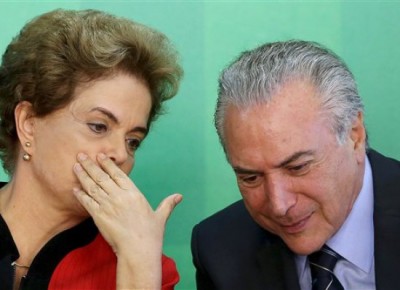Anti-Corruption Protest against Brazil’s Interim President Temer ahead of Rio Olympic Games Opening

Riot police have fired tear gas to subdue protesters in Rio and prevent them from marching towards Maracana Stadium ahead of the Olympic Games opening. Hundreds of people are rallying to express anger at the interim government and costly sports event.
Police used tear gas and stun grenades to disperse several hundred people who had occupied a street near the stadium to protest interim government corruption and the billions spent on organizing the international competition.
Afonso Pena Square became the final destination of the massive anti-corruption march that was held in the city earlier in the day.
Angry over corruption, supporters of Dilma Rousseff, the nation’s ousted president, gathered in front of the Copacabana Palace, where some athletes are staying for the Games. Earlier this year, awmakers in Brazil approved Rousseff’s impeachment process over accusations she hid a budget deficit to have a better chance at re-election in 2014.
Holding signs reading “Fora Temer,” and “Temer Out,” some 3,000 activists came out in support of Rousseff who believe that her removal from office was a “coup” organized by Michel Temer, Rousseff’s vice president, who is currently serving as Brazil’s interim president.
The crowd also spoke out against hosting the Olympics, claiming that he billions spent on the event only aided corruption in the country and only helped the elite. “No to the Olympics!” signs were visible among protesters.
According the a recent Oxford University study about the Olympic Games’ pricetag, just the sports related costs of the event will run to as much as $4.6 billion, approximately 51 percent over the initial budget. But the overall cost will amount to $12 billion, Reuters reported.
“At 156 percent in real terms, the Olympics have the highest average cost overrun of any type of mega-project,” the Oxford study found. “For a city and nation to decide to stage the Olympic Games is to decide to take on one of the most costly and financially most risky type of mega-project that exists, something that many cities and nations have learned to their peril.”
Brazil’s economy was booming when Rio was awarded the games in 2009, but the country is now in its worst recession since the 1930s, with the Brazilian Real losing a third of its value, gross domestic product declining, and inflation and unemployment skyrocketing.

